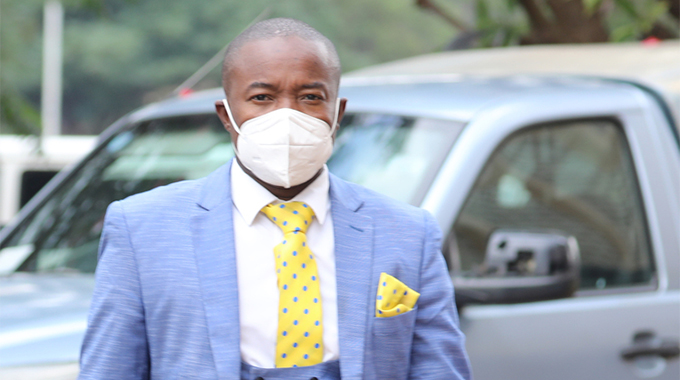The perforating nature of words to the heart

Elliot Ziwira
At The Bookstore
Murume wangu kundirova chaiko zvirinani
Murume wangu kundirova chaiko zvirinani
Muromo wako ipfumo chairo rinobaya
Unoburitsa mazwi anondigara moyo shamwari
Unoburitsa mazwi anondigara moyo shamwari
Saka ndati kundirova zvako zvirinani. . .
Ukandirova zvinopora ndokanganwa shamwari
Ukandirova zvichipora ndokanganwa shamwari
Mazwi ako aunondiudza handikwanise kuakanganwa
Mazwi ako aunondiudza handikwanise kuakanganwa
Mazwi ako induru chaiyo inouraya
Muromo wako ipfumo chairo rinobaya.
Such is the perforating nature of words that the legendary crooner Marshall Munhumumwe bemoans in the timeless song “Kundirova Zvirinani”.
The woman in the touching song appeals to her husband to abstain from using sharp words as a way of expressing a point.
The tongue, she says, perforates the heart like a warrior’s spear, and words are poisonous bile. She would rather take lashes, as words are more piercing than bodily harm in that their penetrating nature punctures the strongest of hearts.
Whereas physical pain ebbs, a burdened spirit remains a stumbling block to future engagements and re-engagements, thus words water down the heart and destroy relationships.
There is something about words in that when they strike they leave an indelible mark.
Central to the theatre of war that humanity grapples with on a daily basis are words. Words are as destructive as they are constructive.
True, the family has a way of destroying or moulding an individual; and words, through their lack or eminence are pivotal in that annihilation or creation.
If words are accompanied by action, which is usually the case, then calamity comes wearing so many ugly faces that Satan can only ogle with envy.
Unlike weapons of mass destruction, like missiles and nuclear armoury that beget fear, deceit and deification, words prick the hardest shell that make up Man’s fortress.
Words are not intimidated by Man’s purported formidable outlook. They simply penetrate the heinous apparition fore-fronted so as to expose the vulnerable inner man.
Inherently, Man is peace-loving, tolerant, harmonious and corrigible, depending on how words are used to appeal to his inborn virtues.
Where mighty fails, words are sacrosanct, for they can neither be blocked nor ignored. Words can turn granite to gold, pebbles to diamonds and monsters to angels.
They only have to be in the custody of a wordsmith, who can smelt, chisel, hone and hammer them into place.
In adept hands, words melt hearts, change lifestyles and inspire the daring, but if not taken good care of, they can be a nuisance with the same negative impact as the positive. Whatever is said cannot be blocked or wished back.
It is against this backdrop that the reading of the poetry anthology, “Shoko Harivhikwi” (2013), edited by Paul Mushumbi and published by ZPH Publishers, becomes revealingly apt.
The anthology purveys the essence of words in building lasting relations.
Nine Zimbabwean poets converge to give impetus to words in the Shona language, in the same way that Marshall Munhumumwe does through his music.
Using varying styles, the poets create a pervading atmosphere that evokes an overabundance of feeling that stitch up human experience.
The turf of being depicted is an all too familiar one for the emerging crop of poets in the Shona tradition. It creates contrasting feelings of both déjà vu and despondence, yet emphasising the mortal consciousness that makes up humanity.
The persona portrayed in the collection are capable of hurting inasmuch as they are prone to hurt and unrequited love.
Sadly, death, the leveller, awaits them at the periphery of their dreams.
Individual struggles permeating existence, and precluding the norms that should be adhered to for the benefit of a shared vision, are captured through a wide range of themes.
Solomon H Munorevesa’s poetry pokes at the tragic outlook of individualism, materialism and intolerance.
His poem “Chashaikwa” takes a swipe at the dearth of commitment in marriage, which jeopardises the family unit, and reflects on the national psyche.
With parents playing truant on the matrimonial base, motivated by irresponsible carnal desires, thrown at the deep end, children suffer emotional and psychological breakdowns.
To curtail the paralysis at the core of the national discourse, Munorevesa advocates love at both personal and national levels.
The poem “Ukama” expresses the same rationale as the poet implores the individual to refrain from thinking in terms of the self.
In “Tauriranai Zvipere” Munorevesa lambasts violence as a way of settling disputes, as this leaves in its wake a trail of broken limbs and hearts.
Violence in all its forms; domestic or political cannot be condoned, because innocent by-standers are always caught up in its web.
As the voice of the voiceless, Munorevesa reproves youths to shy away from experimenting with sex, drugs and alcohol. This, he admonishes, will curb the spread of sexually transmitted diseases like HIV/AIDS, premature aging and death.
Fornication and adultery rob marriage of its sanctity.
The poet takes a swipe at laziness, especially in youths and women, who depend on others for their upkeep, instead of working hard to improve their lot.
Trust Mutekwa explores, among other issues, the significance of familial ties, honesty and hard work.
In “Kureva Zvazviri”, he highlights the sacredness of honesty in fostering strong relationships. Flattering to the poet, is as destructive as prevarication, and therefore, should not be used as a smokescreen to hoodwink others.
The poem “Tsvimbo neDohwe” depicts both the denotative and connotative nature of betrayal.
Denotatively, Mutekwa contemplates what would happen if everyone becomes a bystander, instead of tendering export on the perceived situation, as a way of influencing the outcome.
Connotatively, the poet reflects on the destructive nature of the wait and see attitude permeating the African experience, where diseases, sponsored wars and poverty are in vogue.
Mutekwa implores Africans to be wary of puppetry, and instead honour their own heroes.
Media Mugandani, like Munorevesa, demonstrates how the family moulds the individual, and beseeches the same to rise above societal expectation to raise his/her own stock.
“Mwanasikana” calls on women to go beyond mere childbearing and relying on their husbands for upkeep. She counsels the girl-child to be on the lookout for predators that prey on the vulnerable.
Since the world has long evolved, if they change their mindsets, women can dare men to any occupation.
The emancipation and oppression of women on the basis of culture and religion, also find base in “Mudzimai”.
The poem “Vabereki” appeals to parents to raise their children along commendable societal dictates that shape them for their future tasks as leaders, visionaries and fathers or mothers.
Also, like Munorevesa, Mugandani venerates divine intervention in alleviating the vagaries of nature on Man and his environs.
No matter how much man suffers, his spiritual being will always hoist him to a better pedestal, free of pain and lack.
Using natural imagery and symbolism, Alex Chirumbwana explores Man’s relationship with his fellow men, himself and his environment. This is apt in “Dai ndiri Kamba”, “Rwaivhi”, “Dai ndiri Shiri Zvangu”, “Rwizi” and “Chitima”.
Chirumbwana also visits the controversial issues of love and marriage.
The futility of life and the finality of death, central to the anthology, do not escape his surgical blade, as they are explored in the poems “Mamutora”, “Rufu Rwemhandara”, and “Manditema Midzi Yangu”.
Death, though painful to those left behind, is inevitable, for in life humanity lives with it.
However, in African societies, it is widely believed that no death occurs naturally, because of witchcraft and superstition.
The death of many a young girl like Sara in “Rufu Rwemhandara” is a result of witchcraft, because of avarice and jealousy.
However, in the end those that bring death on others, either through sorcery or violence; domestic or political, face the same fate.
Ushehwedu Kufakurinani’s poems illuminate the darkness in Man’s heart, which draws excitement from the suffering of others.
He points out that laziness, avarice, deceit and fear of the unknown impede progress. The poet laments how lack of will becomes a cancer that stagnates development, particularly on the part of supposed torchbearers, who should steer the wheel of the nation’s fortunes.
Honesty, which is a virtue, as advocated by Mutekwa, may be disparaging or even destructive in some instances.
Some truths are rather left in the backyard of the wordsmith, Kufakurinani affirms. To him, most relationships suffer because of the destructive nature of words.
Words impact the heart in two different ways; positively and negatively.
There are some issues that are safer unsaid than uttered, no matter how honesty one may be.
Cultural norms and values, resilience in the face of adversity, decolonisation of the mind, rule of law and national pride in African societies, find prominence in Alouis Tineyi Sagota’s offering.
Blessing Magodo and Jesca Rushwaya-Marwiro are the other contributors to the anthology.
“Shoko Harivhikwi” is, indeed, a great read.
It captures obtaining issues that weigh down on regeneration and progress; giving stimulus to new collective outcomes devoid of individualism, corruption, deceit, laziness and hypocrisy.










Comments